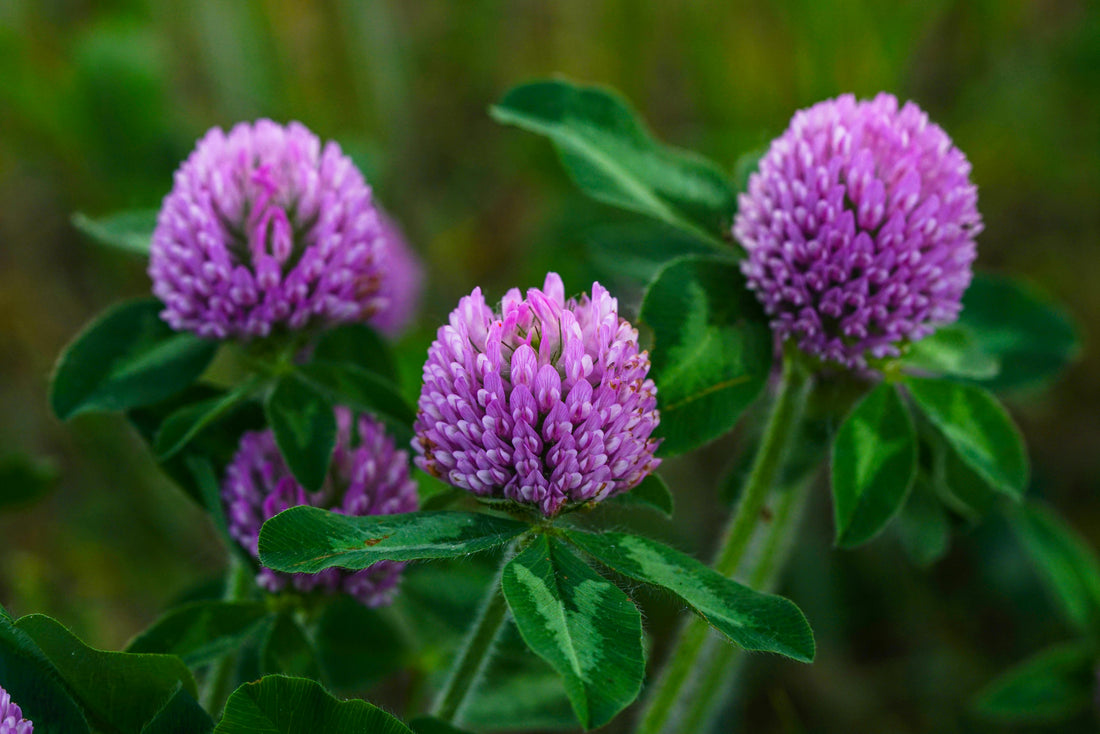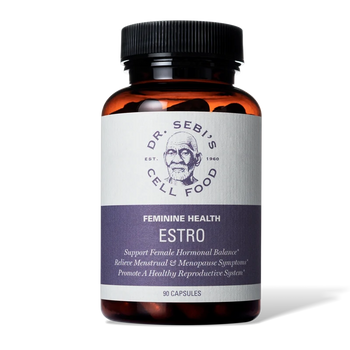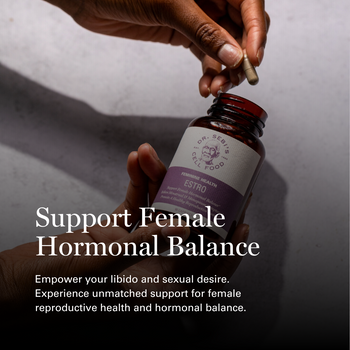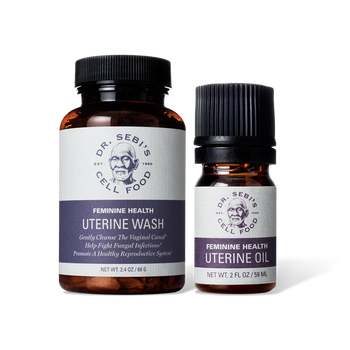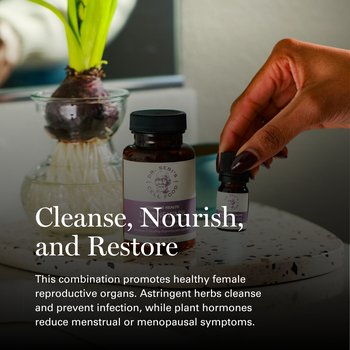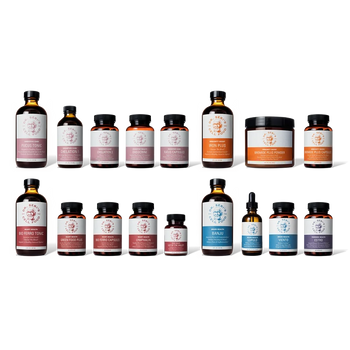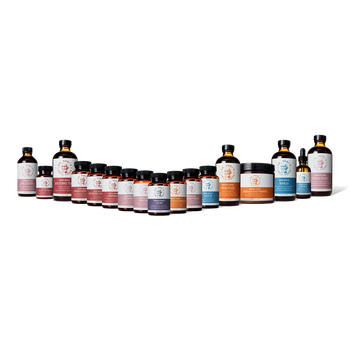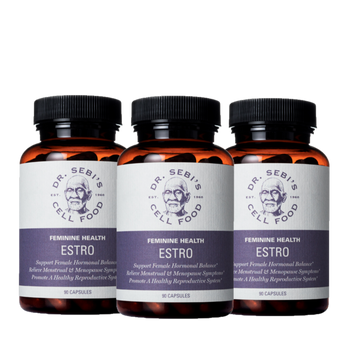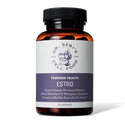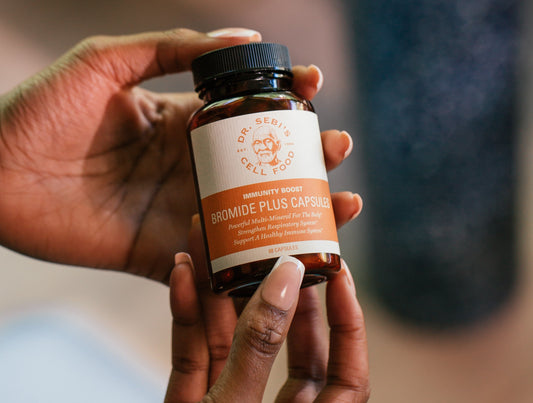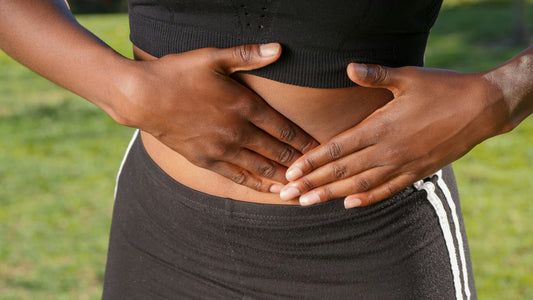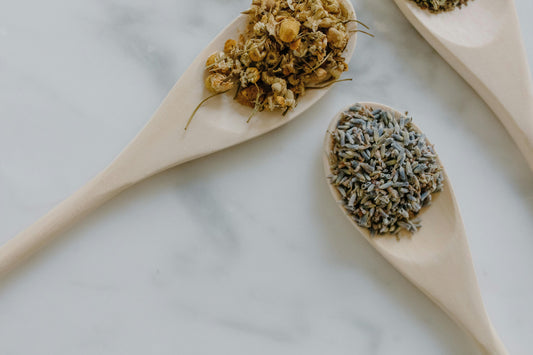If hot flashes, mood swings, and restless nights are stealing your peace, red clover could be the answer you’ve been searching for to help you regain balance and thrive. This powerful herb has been used for centuries to ease menopausal discomfort, helping to regulate hormone levels, reduce inflammation, and support overall health.
With its rich nutrient profile, red clover offers a natural, gentle solution to common menopausal symptoms, promoting a smoother transition and enhancing vitality. Let’s dive into how red clover works its magic and why it should be a staple in every post-menopausal woman's wellness routine.
What Is Red Clover?
Red clover (Trifolium pratense) is a vibrant herb belonging to the legume family and native to Europe, central Asia, and northern Africa. Commonly found in fields and meadows, it’s long been used in traditional medicine for its versatile health benefits, particularly its rich content of bioactive compounds like flavonoids, isoflavones, and antioxidants.
Known for its striking pink to purple flowers, red clover is an alkaline herb that promotes overall wellness. It’s often consumed as a tea, tincture, or in capsule form, offering a natural way to nourish the body and restore balance without harsh side effects.
Red Clover Benefits
Red clover has been used for centuries in traditional medicine to support a wide range of health benefits. Rich in phytoestrogens, compounds that mimic estrogen in the body, red clover is particularly beneficial for menopausal and postmenopausal women, helping to balance hormones naturally.
Ease Menopause Symptoms
Thanks to its high content of phytoestrogens, red clover has been shown to help reduce menopausal symptoms like hot flashes, night sweats, and mood swings, according to a meta-analysis in the Journal of Obstetrics and Gynaecology Research.
Another meta-analysis in Phytomedicine also showed that red clover extract reduced the frequency and severity of hot flashes in menopausal and postmenopausal women. By supporting hormonal balance, red clover offers a natural alternative to hormone replacement therapy (HRT), providing relief without the risk of synthetic hormones.
Decrease Risk of Osteoporosis
Osteoporosis is a common concern for postmenopausal women due to a drop in estrogen levels, which can lead to bone loss. Red clover has been shown to help support bone health by enhancing the body’s ability to retain calcium and other vital minerals by mimicking estrogen’s protective effect on bone mineral density, according to a meta-analysis in Osteoporosis International.
Improve Skin and Hair
Red clover is also beneficial for improving skin and hair health, thanks to its high antioxidant content, which helps to combat oxidative stress that can lead to premature aging. The isoflavones found in red clover are known to stimulate collagen production, which is essential for maintaining skin elasticity and reducing wrinkles.
Studies, such as one in the Obstetrics and Gynecology International, have shown that red clover extract can improve hair and skin texture, appearance, and overall quality. Its detoxifying properties also support clear, glowing skin by reducing inflammation and purging toxins that can contribute to acne and other skin issues.
Boost Heart Health
Red clover has been found to have a positive impact on heart health, largely due to its ability to help lower cholesterol levels and improve circulation. The isoflavones in red clover have been shown to reduce LDL (bad cholesterol) and increase HDL (good cholesterol), contributing to a healthier lipid profile.
A study in Climacteric found that red clover extract helped improve cardiovascular risk factors, such as cholesterol and triglyceride levels, in postmenopausal women. Additionally, red clover’s antioxidant properties help reduce inflammation in the blood vessels, promoting better circulation and overall heart health.
Dosage and How to Use Red Clover
Red clover is available in various forms, including teas, capsules, extracts, and powders. Dr. Sebi’s offers two red clover supplements: Estro, which supports female reproductive health and hormonal balance, and our Uterine Wash and Oil, which gently cleanses the vaginal canal and helps fight fungal infections.
Shop All Feminine Health
The proper dosage depends on the form being used and individual health needs. As with any herbal remedy, it's important to start with small doses and monitor your body's response.
Typically, for adults, one to two teaspoons of dried red clover flowers can be steeped in hot water to make a tea, which can be consumed up to two to three times per day. If using red clover extract or capsules, the standard dose is usually 40 to 80 milligrams per day, though it's always best to follow the instructions on the specific product.
For menopausal relief, red clover is often taken over a period of weeks to notice its full benefits, as its phytoestrogens work gradually to support hormonal balance. It can also be added to smoothies or used in recipes as a supplement to your regular diet.
Potential Side Effects of Red Clover
While red clover is generally considered safe for most people when used in moderation, it’s important to be aware of potential side effects and take certain precautions.
Red clover contains phytoestrogens, which mimic the effects of estrogen in the body. This can be beneficial for hormone balance, but may cause issues for individuals with hormone-sensitive conditions such as breast cancer, ovarian cancer, or uterine cancer. If you have any of these conditions or a history of hormone-sensitive issues, it’s essential to consult with a healthcare provider before using red clover.
In rare cases, red clover may cause mild side effects like nausea, headache, or digestive discomfort. These side effects are usually temporary and subside as the body adjusts. If you experience any severe reactions, such as an allergic response or persistent discomfort, it’s important to discontinue use and seek medical advice.
Pregnant or breastfeeding women should also avoid using red clover without consulting a healthcare provider. Additionally, because red clover can influence blood clotting, individuals taking blood thinners (such as warfarin) or those with bleeding disorders should exercise caution and consult their healthcare provider before using it.
Frequently Asked Questions
Who should not take red clover?
Red clover should be avoided by individuals with hormone-sensitive conditions, such as breast, ovarian, or uterine cancer, as it contains phytoestrogens that can mimic estrogen in the body. Pregnant or breastfeeding women should also avoid red clover, as there’s limited research on its safety during pregnancy and lactation.
Additionally, those on blood-thinning medications, such as warfarin, or individuals with bleeding disorders should consult a healthcare provider before using red clover, as it may affect blood clotting.
How long does it take for red clover to work?
The effects of red clover can take a few weeks to become noticeable, particularly when used for balancing hormones or alleviating menopausal symptoms. Typically, consistent use for three to four weeks is recommended to experience the full benefits, as the phytoestrogens in red clover work gradually to support hormonal balance and improve overall health. For detox and skin benefits, some individuals may notice results within a shorter period.
What is the difference between red clover flowers and red clover extract?
Red clover flowers refer to the whole, dried plant flowers, which can be used to make tea or added to smoothies. On the other hand, red clover extract is a concentrated form of the plant, typically made by extracting the beneficial compounds from the flowers. Extracts offer a more potent dose of red clover’s active ingredients and are often used in capsule or liquid form.
